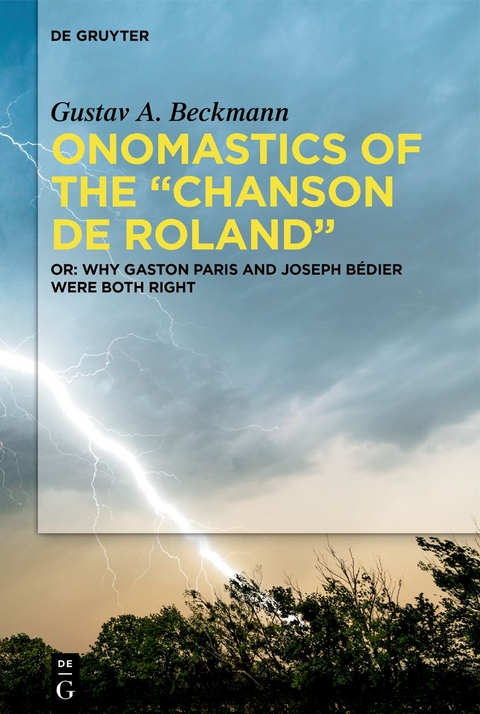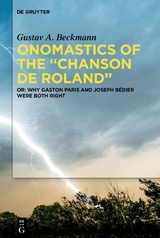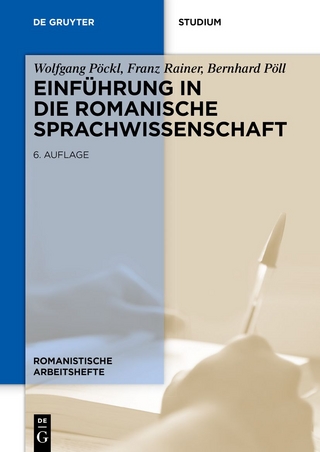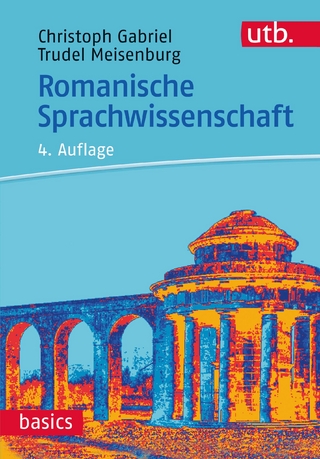Onomastics of the “Chanson de Roland”
Or: Why Gaston Paris and Joseph Bédier were both right
Seiten
2023
De Gruyter (Verlag)
978-3-11-074590-0 (ISBN)
De Gruyter (Verlag)
978-3-11-074590-0 (ISBN)
This ambitious study of all proper names in the Chanson de Roland is based for the first time on a systematic survey of the whole geographical and historical literature from antiquity to after 1100 for the Geographica, and on working through (almost) the entire documentary tradition of France and its neighbouring regions from 778 to the early 12th century for the personal names. The overall result is clear: the surviving song is more tightly and profoundly structured, even in smaller scenes, than generally assumed, it is also richer in depicting reality, and it has a very long prehistory, which can be traced in outline, albeit with decreasing certainty, (almost) back to the Frankish defeat of 778. Here are some individual results: for the first time, a detailed (and ultimately simple!) explanation not only of the ‘pagan’ catalogue of peoples, but also of the overarching structure of Baligant’s empire, the organisation of North Africa, the corpus of the Twelve Anti-Pairs as well as the ‘pagan’ gods are given, and individual names such as Bramimunde and Jurfaret, toponyms such as Marbrise and Marbrose are explained. From Roland’s Spanish conquests (v. 196–200), the course of the elapsed set anz toz pleins is reconstructed. Even the names of the weapons prove to be a small structured group, in that they are very discreetly adapted to their respective ‘pagan’ or Christian owner. On the Christian side, the small list of relics in Roland’s sword is also carefully devised, not least in what is left out: a relic of the Lord; this is reserved for Charlemagne’s Joiuse. The author explains for example, why from the archangel triad only Michael and Gabriel descend to the dying Roland, whereas ‘the’ angel Cherubin descends in Rafael’s place. Munjoie requires extensive discussion, because here a (hitherto insufficiently recorded) toponym has been secondarily charged by the poet with traditional theological associations. The term Ter(e) major is attested for the first time in reality, namely in the late 11th century in Norman usage. For the core of France, the fourth cornerstone – along with Besançon, Wissant and Mont-Saint-Michel – is Xanten, and its centre is Aachen. The poet’s artful equilibration of Charles’s ten eschieles and their leaders is traced. The "Capetian barrier" emerges as a basic fact of epic geography. Approximatively, the last quarter of the study is devoted to the prehistory of the song, going backwards in time: still quite clearly visible is an Angevin Song of Roland from around 1050, in which Marsilĭe, Olivier, Roland, Ganelon, Turpin and Naimes already have roles similar to those in the preserved Song. Behind it, between about 970 and shortly after 1000, is the Girart de Vienne from the Middle Rhône, already recognised by Aebischer, with the newly invented Olivier contra Roland. Finally, in faint outlines, an oldest attainable, also Middle Rhône adaptation of the Roland material from shortly after 870 emerges. For the Chanson de Roland, Gaston Paris and Joseph Bédier were thus each right on the main point that was close to their hearts: the surviving song has both the thoroughly sophisticated structure of great art that Bédier recognised in it, and the imposingly long prehistory that Paris conjectured.
lt;strong>Gustav Adolf Beckmann, Professor emeritus, Trier University, Germany.
| Erscheinungsdatum | 14.02.2023 |
|---|---|
| Übersetzer | Linda Archibald |
| Verlagsort | Berlin/Boston |
| Sprache | englisch |
| Maße | 155 x 230 mm |
| Gewicht | 1815 g |
| Themenwelt | Geisteswissenschaften ► Sprach- / Literaturwissenschaft ► Romanistik |
| Geisteswissenschaften ► Sprach- / Literaturwissenschaft ► Sprachwissenschaft | |
| Schlagworte | Altfranzösisch • Chanson de Roland • Epenforschung • epic poem • Medieval French Literature • Namenforschung • Onomastics • Rolandslied |
| ISBN-10 | 3-11-074590-9 / 3110745909 |
| ISBN-13 | 978-3-11-074590-0 / 9783110745900 |
| Zustand | Neuware |
| Haben Sie eine Frage zum Produkt? |
Mehr entdecken
aus dem Bereich
aus dem Bereich
Deutsch – Französisch – Italienisch – Spanisch
Buch | Softcover (2023)
Narr Francke Attempto (Verlag)
27,99 €




